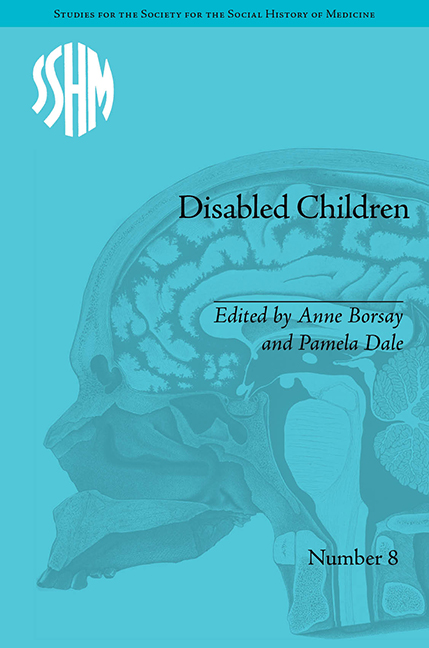Book contents
- Frontmatter
- Contents
- Acknowledgements
- Notes on Contributors
- Introduction: Disabled Children – Contested Caring
- 1 Club Feet and Charity: Children at the House of Charity, Soho, 1848–1914
- 2 Insanity, Family and Community in Late-Victorian Britain
- 3 The Mixed Economy of Welfare and the Care of Sick and Disabled Children in the South Wales Coalfield, c. 1850–1950
- 4 The Question of Oralism and the Experiences of Deaf Children, 1880–1914
- 5 Exploring Patient Experience in an Australian Institution for Children with Learning Disabilities, 1887–1933
- 6 From Representation to Experience: Disability in the British Advice Literature for Parents, 1890–1980
- 7 Treating Children with Non-Pulmonary Tuberculosis in Sweden: Apelviken, c. 1900–30
- 8 Health Visiting and Disability Issues in England before 1948
- 9 Spanish Health Services and Polio Epidemics in the Twentieth Century: The ‘Discovery’ of a New Group of Disabled People, 1920–70
- 10 Cured by Kindness? Child Guidance Services during the Second World War
- 11 Education, Training and Social Competence: Special Education in Glasgow since 1945
- 12 Hyperactivity and American History, 1957–Present: Challenges to and Opportunities for Understanding
- Notes
- Index
4 - The Question of Oralism and the Experiences of Deaf Children, 1880–1914
- Frontmatter
- Contents
- Acknowledgements
- Notes on Contributors
- Introduction: Disabled Children – Contested Caring
- 1 Club Feet and Charity: Children at the House of Charity, Soho, 1848–1914
- 2 Insanity, Family and Community in Late-Victorian Britain
- 3 The Mixed Economy of Welfare and the Care of Sick and Disabled Children in the South Wales Coalfield, c. 1850–1950
- 4 The Question of Oralism and the Experiences of Deaf Children, 1880–1914
- 5 Exploring Patient Experience in an Australian Institution for Children with Learning Disabilities, 1887–1933
- 6 From Representation to Experience: Disability in the British Advice Literature for Parents, 1890–1980
- 7 Treating Children with Non-Pulmonary Tuberculosis in Sweden: Apelviken, c. 1900–30
- 8 Health Visiting and Disability Issues in England before 1948
- 9 Spanish Health Services and Polio Epidemics in the Twentieth Century: The ‘Discovery’ of a New Group of Disabled People, 1920–70
- 10 Cured by Kindness? Child Guidance Services during the Second World War
- 11 Education, Training and Social Competence: Special Education in Glasgow since 1945
- 12 Hyperactivity and American History, 1957–Present: Challenges to and Opportunities for Understanding
- Notes
- Index
Summary
Introduction
In 1880, the delegates of the International Congress on the Education of the Deaf in Milan met to discuss the direction of deaf education. Their attention was focused specifically on the role of articulation and speech, in contrast to the prevalent sign-language-based manual teaching methods. Of its 164 attendees, 139 represented the Italian and French clergy, five people each comprised the British and American delegations and only two were deaf. On 11 September, the delegates voted 160 votes to four, for the ‘incontestable superiority of speech over signs, for restoring deaf mutes to social life and giving them greater superiority in language’. With hardly a single deaf voice, the Congress began the process of removing sign language from the education of deaf children across the world. A year later, British headmasters gathered at the Conference of Head Masters of Institutions and of Other Workers for the Education of the Deaf and Dumb in London. They discussed the ‘pure oral’ system advocated in Milan, which would teach articulation and lip-reading rather than signs. Richard Elliott, headmaster of the Old Kent Road and Margate schools, presented the opening paper, musing on the Congress's recommendation of the abandonment of signs:
If I believed that the Congress at Milan had settled the question, I should have said change your system – I do not believe it has done so, so far as the English language is concerned, but it has brought forward prominently the claims of the system it advocates, and therefore, I say, try it – but try it without sacrificing the interests of any child in the enlightenment it seeks at your hands.
- Type
- Chapter
- Information
- Disabled ChildrenContested Caring, 1850–1979, pp. 59 - 72Publisher: Pickering & ChattoFirst published in: 2014



